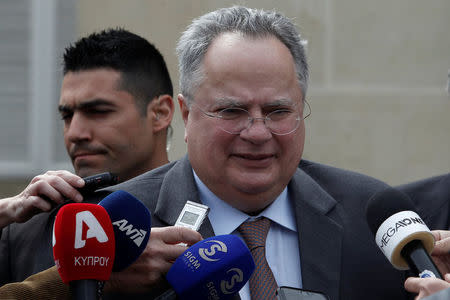U.N. to host Cyprus leaders April 2, first since breakdown in February
By Michele Kambas ATHENS (Reuters) - The leaders of Cyprus's estranged Greek and Turkish Cypriot communities will meet over dinner next Sunday in a first encounter of the two since peace talks were abruptly interrupted in February, the United Nations said on Monday. Reunification talks hit the latest in a long line of snags last month over a decision by Greek Cypriot lawmakers to commemorate the 1950 referendum which had then sought to unite the island with Greece -- infuriating Turkish Cypriots. Espen Barth Eide, the special adviser to the United Nations secretary-general, will host a dinner for Greek Cypriot leader Nicos Anastasiades and Turkish Cypriot leader Mustafa Akinci on April 2, his office said in a statement. The dinner will take place in the United Nations-controlled buffer zone dividing Cyprus's capital, Nicosia. "They will have an opportunity for a frank exchange of views and (to outline) their intentions," said Ioannis Kasoulides, Cyprus's foreign minister. "Differences are solved at the negotiation table, and not away from it." Cyprus was split when Turkey invaded in 1974 in a move triggered by a brief Greek-inspired coup. The seeds of division were sowed much earlier when a power-sharing government crumbled amid fighting in 1963, just three years after the island gained independence from Britain. Peace talks between Anastasiades and Akinci to unite Cyprus under a federal umbrella had been progressing well until the unexpected row over the 67-year old plebiscite, a throwback to Cyprus's colonial era. Turkey, whose role in a post-reunification Cyprus remains a highly sensitive issue in the talks, will hold a referendum on April 16 on boosting the powers of President Tayyip Erdogan. The country has up to 30,000 troops in north Cyprus, a breakaway Turkish Cypriot state recognised only by Ankara. One of the main stumbling blocks in negotiations is resolving the status of Cyprus's so-called guarantor powers -- Britain, Greece and Turkey -- which allows their intervention to restore a breakdown of constitutional order. Greek Cypriots and Greece want the provisions to be scrapped, while Erdogan has repeatedly said a Turkish presence must be maintained in a settlement. Greek Foreign Minister Nikos Kotzias, who was visiting Nicosia on Monday, said Turkey "abandoned" previous peace talks in Geneva in January this year because it was not prepared to give on the issue. Turkey had said the same of the Greek side at the time. "I consider these so-called rights of intervention non-existent, and illegal," Kotzias told journalists. (Editing by Jeremy Gaunt)

 Yahoo News
Yahoo News 

